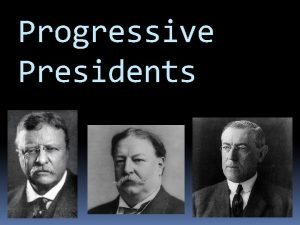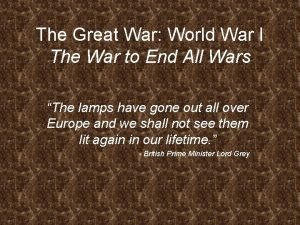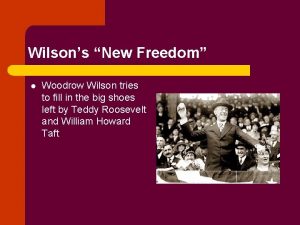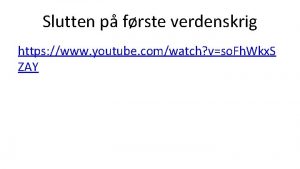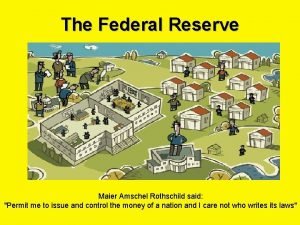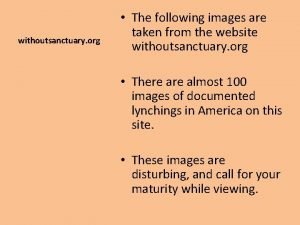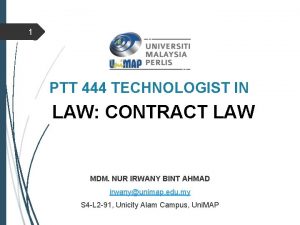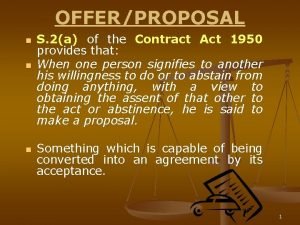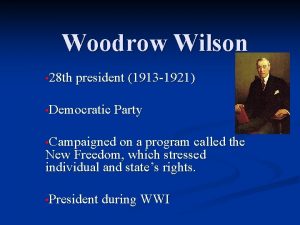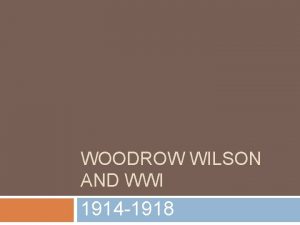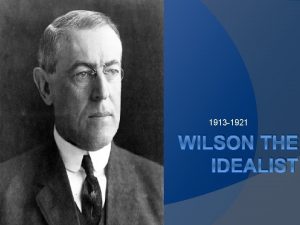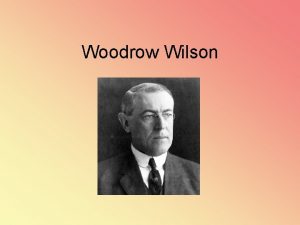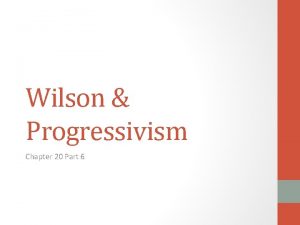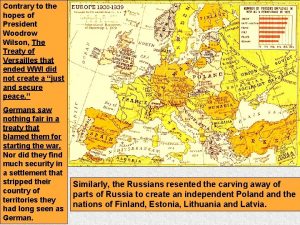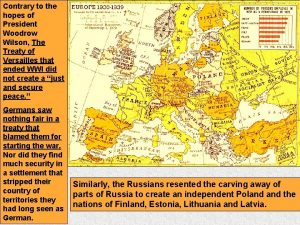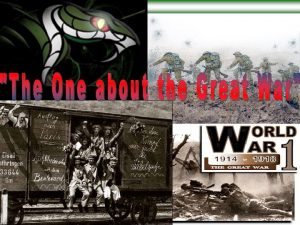Woodrow Wilson 28 th president 1913 1921 Democratic












- Slides: 12

Woodrow Wilson • 28 th president (1913 -1921) • Democratic Party • Campaigned on a program called the New Freedom, which stressed individual and state’s rights. • President during WWI

Wilson’s Rhetoric Techniques n n n “Prolific public communicator, ” as he was concerned with reaching all people in the audience, not just the elite. He saw democracy as a tool for creating harmony within the nation Most of Wilson’s speeches spoke directly to the people, rather than the Congress Spoke of peace and equality Spoke to unify Americans as partners with other countries

“Wilson used rhetoric memorably and effectively…it was because he knew that words counted, and that great words, at rare moments in a nation’s life, can have the force of great deeds. ”—Mary Stuckey

Wilson’s Governing Ideals v Nonpartisan Leadership -rather than speaking on behalf of a political party, Wilson referred to the people as a united group. “I am not interested in a party that is not an embodied program based upon a set of principles; and our present job is to get the people who believe in principles to stand shoulder to shoulder and to do things from one side of the continent to the other” --Remarks to the press at the first press conference

v The Limits of Leadership -Wilson believed the president was powerful leader, but not he the only force. The people were his leaders. “I have not yet presented any legislature my private views on any subject, and I never shall; because I conceive it to be part of the whole process of government that I shall be spokesman for somebody, not for myself. ” --Wilson speaking to a delegation from the Nations Suffrage Convention

v. National Identity -Wilson identified American as acting in a united interest. Americans were equal and not divided; therefore it was his task to strengthen the unity. “To such a task we can dedicate or Eves and our fortunes, everything that we are and everything that we have, with the pride for those who know that the day has come when America is privileged to spend her blood and her might for the principles that gave her birth and happiness and the peace which she has treasured. ”— Wilson’s War Message

Wilson’s War Message On April 2, 1917 Wilson addressed the Congress to declare war. n n It began with the Germans use of unrestricted submarine warfare. On May 7 th, 1915 a German submarine (u-boat) sank the British cruise ship Lusitania. 1, 198 people were killed, including 128 Americans. Attacks continued and the US became involved.

The Rhetoric of the War Message Wilson makes it clear that it is a war against all nations n He makes a distinction between people and the government, reiterating that Americans did not hate the Germans. n “Neutrality is no longer feasible or desirable where the peace of the world is involved and the freedom of its peoples, and the menace to that peace and freedom lies in the existence of autocratic governments backed by organized fore which is controlled wholly buy their will, not by the will of their people. ” n

Wilson’s Fourteen Points Delivered on January 8, 1918 ► The Fourteen Points were Wilson’s response to Post WWI ► He proposed a program for world peace through The League of Nations -Open covenants of peace, free trade, equal treatments of all nations, etc. ►

The Rhetoric of The Fourteen Points ► ► ► “The program of the world’s peace, therefore, is our program; and that program, the only possibly program, as we see it, is this: . . . ” When addressing the Congress Wilson briefly discusses the objects war and his desire for peace for the world. A shorter speech, with shorter sentence, focusing mainly on the proposed points Wilson asks rhetorical questions throughout the speech, forcing Congress to think about what he is presenting, rather than simply hearing his opinions. Wilson describes the people of the world as “partners, ” establishing national unity.

Peace In Both Speeches Wilson emphasizes that idea of peace being beneficial for all nations In both speeches, Wilson makes reference to democracy, implying the desire for safety and security. Americans are not divided in either speech therefore proving his principle of national unity. There is a clear statement made in both speeches that the German people are not hated by Americans then are not jealous of German power. Wilson, then, makes the distinction between people and their government.

Roosevelt and Wilson Both presidents stressed the importance of the people’s role in government They each were mediators of working toward peace Roosevelt and Wilson used rhetoric concerning improvement. Roosevelt spoke for environmental issues, and Wilson spoke for national equality and peace after the war. Both presidents advocated strengthening the role of the US in international affairs.
